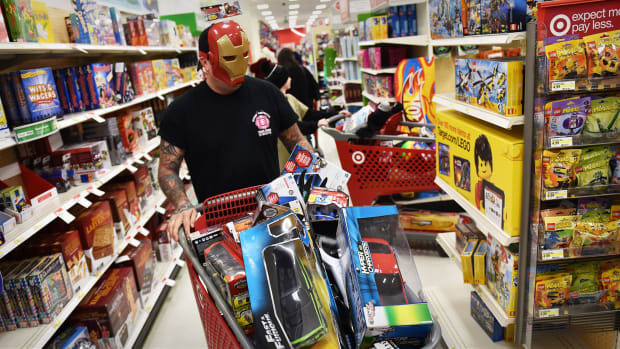Halloween remains more than two weeks away and Walmart (WMT), Amazon (AMZN), and Target (TGT) have already kicked off the holiday shopping season. That seems like it would be good for consumers, but it's mostly confusing as nobody knows when the best deals are and if they should be shopping now or waiting until closer to the actual holiday season.
Call it Christmas creep or an early Black Friday, it's actually a mishmash of deals that have left consumers confused. It used to be very simple. Black Friday -- the day after Thanksgiving -- kicked off the holiday shopping season with incredible in-store deals that eventually were spread throughout the entire weekend.
Later, Cyber Monday was added where retailers offered their best digital deals and consumers snapped those up too. It was chaotic and stores were crowded as people fought over super-cheap TVs or to get the last Hatchimal or other trendy toys, but the premise was easy to explain.
Now, the deals start in October and about a third of the way into October, Amazon has already offered something called "Prime Early Access." These are deals that Walmart and Target have more or less copied. It has created confusion for consumers and made holiday shopping harder and less fun.

Ben Hasty/MediaNews Group/Reading Eagle via Getty Images
Amazon, Target, Walmart, All Want To Be First
The pandemic took the growing problem of holiday creep and made it worse. Walmart, Target, and other brick-and-mortar chains had to abandon the idea of having people sleep outside their stores to get the best Black Friday deals. Covid made that a really bad idea and social distancing protocols forced retailers to spread their sales out and offer the same deals online as in-store.
Those fears haven't entirely passed, but people mostly don't worry about crowds, so Walmart, Amazon, and Target could have reverted to a more traditional holiday schedule. Instead, all three have doubled down on Christmas in October and that makes it a more challenging season for consumers.
Retailers offer sales because they want to drive customers to their store, in theory before they spend their holiday budget at another store. When sales become perennial, however, they stop meaning much because consumers no longer know when they get the best deal.
It always made sense for Amazon to do a second Prime Days promotion for the holiday season, it's not like the retailer won't offer Black Friday and Cyber Monday deals. The same is true for Walmart and Target, which creates a sort of chaos for consumers.
Black Friday Isn't Coming Back
The reality is that Amazon, Walmart, and Target will crowd out lesser retailers using the three months of Christmas strategy. It may even be the right strategy for those companies even if it's one that makes holiday shopping harder for customers.
There used to be two clear times to get good deals during the time between Thanksgiving and Christmas. You had the Black Friday through Cyber Monday period then you could take your chances on some retailers ending up with extra inventory in the week before Christmas they wanted to move.
That was not guaranteed to happen so a lot of sales were funneled into the extended Thanksgiving weekend. Now, consumers simply don't know when they should shop and that means either being content with good, but maybe not the best deals, or spending a lot of time tracking prices and making returns.







